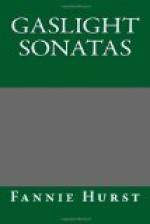Were times when Mrs. Hanna Burkhardt, who lived on the edge of a village in one such childless house, could in her fancy hear the flutter of wings, too. There had once been a visit to a doctor in High Street because of those head-noises and the sudden terror of not being able to swallow. He had stethoscoped and prescribed her change of scene. Had followed two weeks with cousins fifty miles away near Lida, Ohio, and a day’s stop-over in Cincinnati allowed by her railroad ticket. But six months after, in the circle of glow from a tablelamp that left the corners of the room in a chiaroscuro kind of gloom, there were again noises of wings rustling and of water lapping and the old stricture of the throat. Across the table, a Paisley cover between them, Mr. John Burkhardt, his short spade of beard already down over his shirt-front, arm hanging lax over his chair-side and newspaper fallen, sat forward in a hunched attitude of sleep, whistling noises coming occasionally through his breathing. A china clock, the centerpiece of the mantel, ticked spang into the silence, enhancing it.
Hands in lap, head back against the mat of her chair, Mrs. Burkhardt looked straight ahead of her into this silence—at a closed door hung with a newspaper rack, at a black-walnut horsehair divan, a great sea-shell on the carpet beside it. A nickelplated warrior gleamed from the top of a baseburner that showed pink through its mica doors. He stood out against the chocolate-ocher wallpaper and a framed Declaration of Independence, hanging left. A coal fell. Mr. Burkhardt sat up, shook himself of sleep.
“Little chilly,” he said, and in carpet slippers and unbuttoned waistcoat moved over to the base-burner, his feet, to avoid sloughing, not leaving the floor. He was slightly stooped, the sateen back to his waistcoat hiking to the curve of him. But he swung up the scuttle with a swoop, rattling coal freely down into the red-jowled orifice.
“Ugh, don’t!” she said. “I’m burnin’ up.”
He jerked back the scuttle, returning to his chair, and, picking up the fallen newspaper, drew down his spectacles from off his brow and fell immediately back into close, puckered scrutiny of the printed page.
“What time is it, Burkhardt? That old thing on the mantel’s crazy.”
He drew out a great silver watch.
“Seven-forty.”
“O God!” she said. “I thought it was about ten.”
The clock ticked in roundly again except when he rustled his paper in the turning. The fire was crackling now, too, in sharp explosions. Beyond the arc of lamp the room was deeper than ever in shadow. Finally John Burkhardt’s head relaxed again to his shirt-front, the paper falling gently away to the floor. She regarded his lips puffing out as he breathed. Hands clasped, arms full length on the table, it was as if the flood of words pressing against the walls of her, to be shrieked rather than spoken, was flowing over to him. He jerked erect again, regarding her through blinks.




